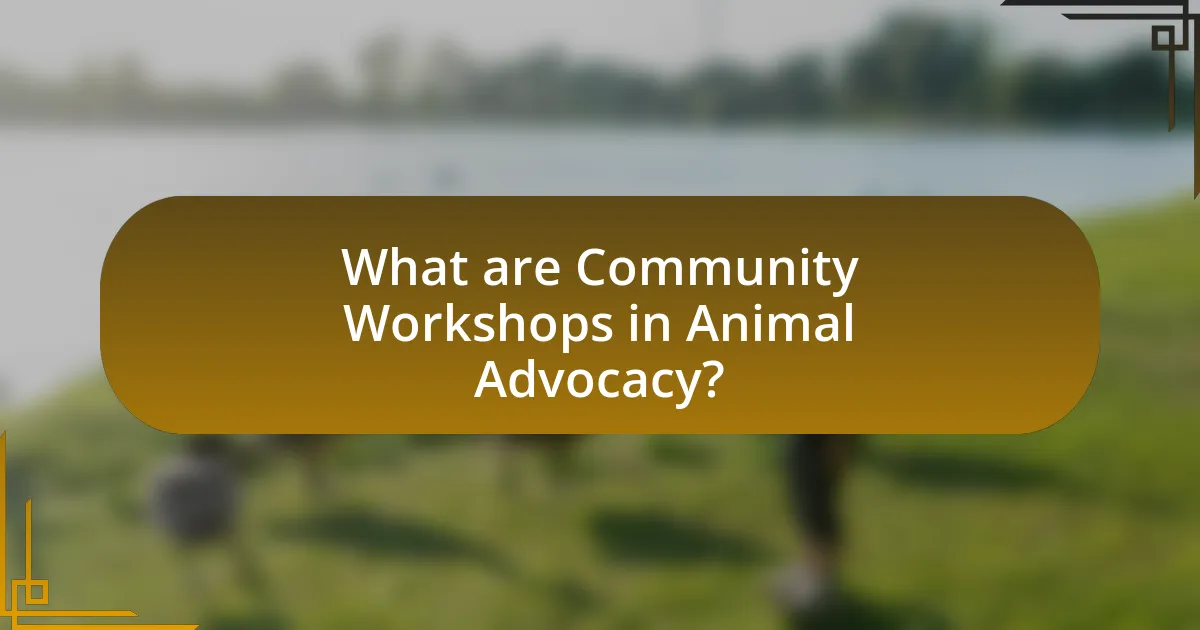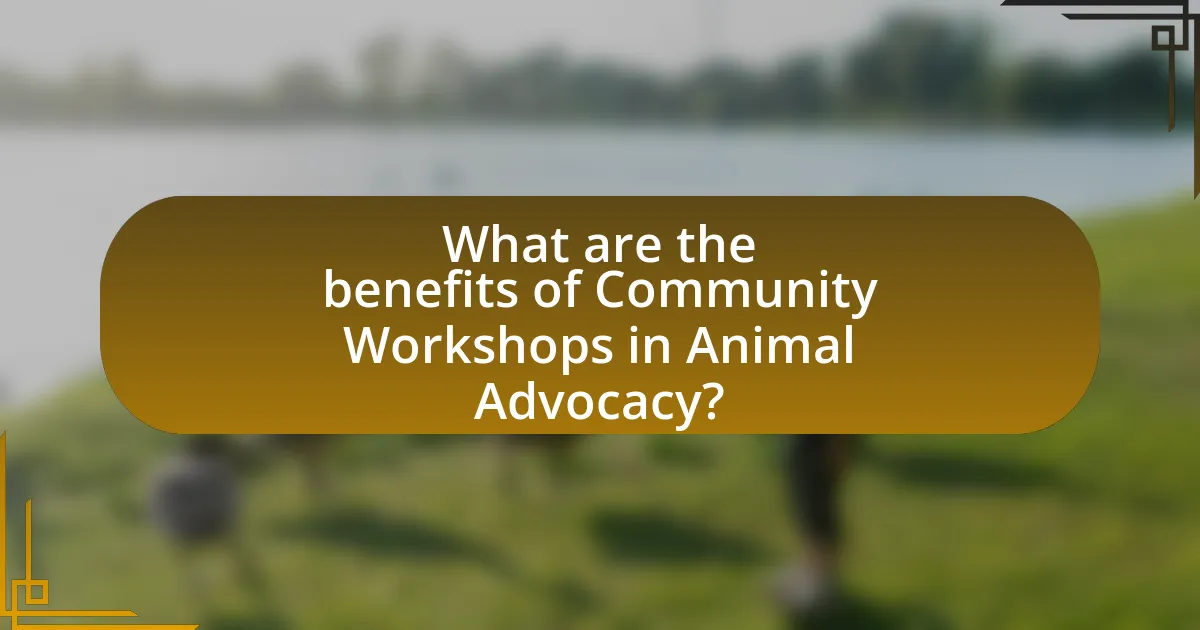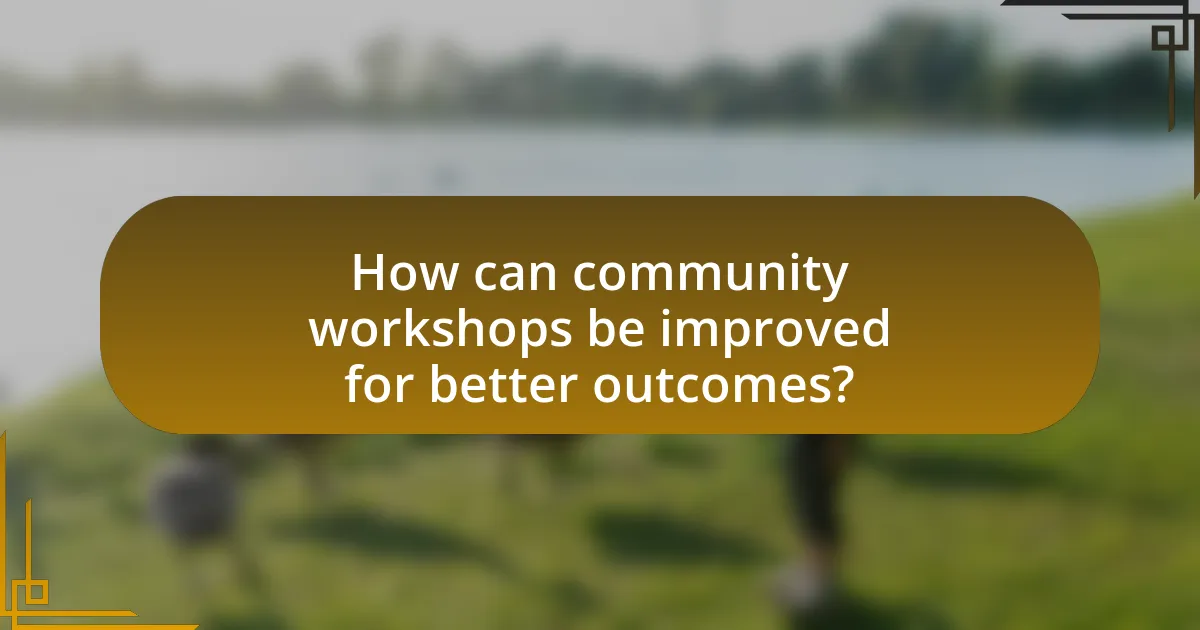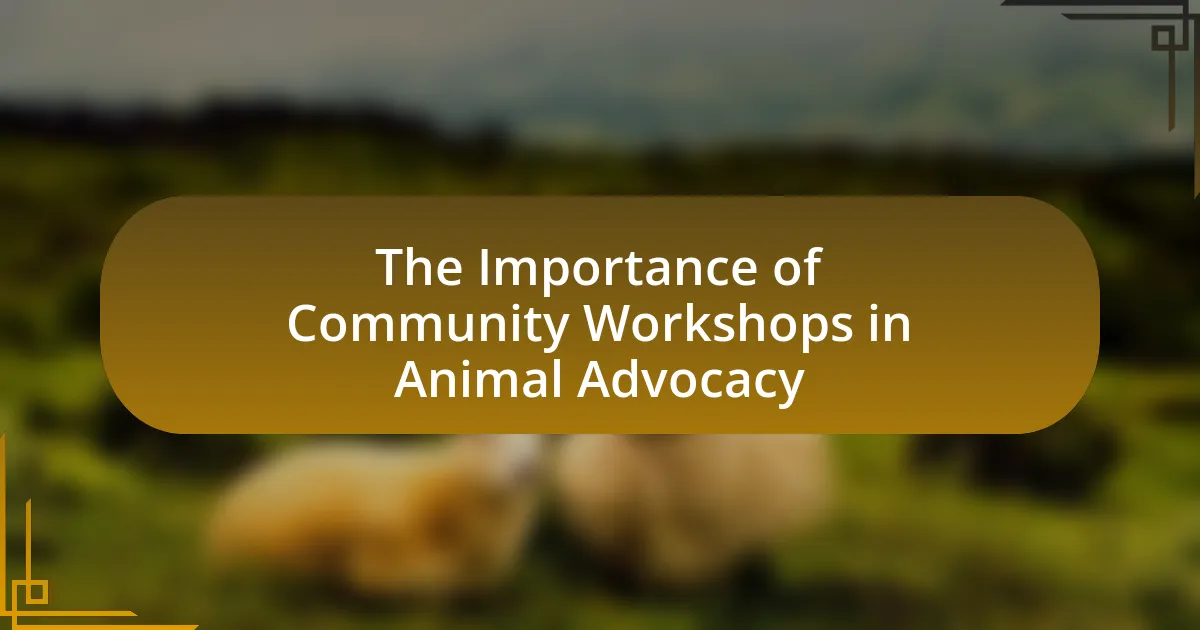Community Workshops in Animal Advocacy are organized events designed to educate and engage the public on animal welfare and rights issues. These workshops enhance advocacy efforts by fostering education, collaboration, and skill development among participants, leading to increased awareness and community involvement. Key activities include educational presentations, hands-on training, and group discussions, with diverse participants such as local residents, advocacy organizations, and subject matter experts. The workshops play a crucial role in changing perceptions about animals, influencing local legislation, and empowering communities to advocate for animal rights effectively.

What are Community Workshops in Animal Advocacy?
Community Workshops in Animal Advocacy are organized events aimed at educating and engaging the public on issues related to animal welfare and rights. These workshops typically involve interactive sessions where participants learn about advocacy strategies, animal care, and the importance of community involvement in promoting animal protection. Research indicates that such workshops can significantly increase awareness and motivate individuals to take action, thereby enhancing community support for animal advocacy initiatives.
How do community workshops contribute to animal advocacy efforts?
Community workshops significantly enhance animal advocacy efforts by fostering education, engagement, and collaboration among participants. These workshops provide a platform for individuals to learn about animal welfare issues, share experiences, and develop advocacy skills. For instance, studies show that community engagement initiatives can increase awareness and support for animal rights, leading to more effective advocacy campaigns. Additionally, workshops often facilitate partnerships between local organizations and community members, amplifying the reach and impact of advocacy efforts. This collaborative approach has been proven to mobilize resources and create a stronger, unified voice for animal welfare in various communities.
What types of activities are typically included in these workshops?
Community workshops in animal advocacy typically include activities such as educational presentations, hands-on training sessions, group discussions, and outreach initiatives. Educational presentations provide participants with knowledge about animal welfare issues, while hands-on training sessions equip attendees with practical skills for advocacy. Group discussions foster collaboration and idea-sharing among participants, and outreach initiatives often involve community engagement efforts to raise awareness about animal rights. These activities are designed to empower individuals and promote effective advocacy strategies within the community.
Who are the key participants in community workshops?
Key participants in community workshops include local residents, animal advocacy organizations, subject matter experts, and facilitators. Local residents contribute their perspectives and experiences related to animal welfare, while animal advocacy organizations provide resources and support for the workshops. Subject matter experts, such as veterinarians or animal behaviorists, offer specialized knowledge that enhances the discussions. Facilitators guide the workshop process, ensuring that all voices are heard and that the objectives are met. This diverse participation fosters a collaborative environment essential for effective animal advocacy initiatives.
Why are community workshops essential for raising awareness?
Community workshops are essential for raising awareness because they facilitate direct engagement and education among participants. These workshops provide a platform for sharing knowledge about animal advocacy, allowing community members to learn about issues such as animal welfare, conservation, and responsible pet ownership. Research indicates that interactive learning environments, like workshops, significantly enhance retention of information and motivate individuals to take action. For instance, a study published in the Journal of Environmental Education found that participants in hands-on workshops demonstrated a 40% increase in knowledge retention compared to traditional lecture formats. This evidence underscores the effectiveness of community workshops in fostering informed advocates who can contribute to animal welfare initiatives.
How do workshops educate the public about animal rights?
Workshops educate the public about animal rights by providing interactive learning experiences that raise awareness and foster understanding of animal welfare issues. These workshops often include presentations, discussions, and hands-on activities that engage participants in critical topics such as ethical treatment of animals, the impact of factory farming, and the importance of adopting pets from shelters. Research indicates that educational programs significantly increase knowledge and change attitudes towards animal rights; for instance, a study published in the Journal of Animal Ethics found that participants in animal rights workshops reported a 40% increase in their understanding of animal welfare issues. This evidence demonstrates that workshops effectively inform and empower individuals to advocate for animal rights.
What role do workshops play in changing perceptions about animals?
Workshops play a crucial role in changing perceptions about animals by providing hands-on education and fostering empathy among participants. These interactive sessions allow individuals to engage directly with animals, learn about their behaviors, and understand their needs, which can shift preconceived notions and biases. Research indicates that experiential learning, such as that found in workshops, significantly enhances emotional connections to animals, leading to more compassionate attitudes. For instance, a study published in the Journal of Applied Animal Welfare Science found that participants in animal welfare workshops reported increased empathy and a greater understanding of animal rights issues. This evidence supports the effectiveness of workshops in transforming how people view and relate to animals.

What are the benefits of Community Workshops in Animal Advocacy?
Community workshops in animal advocacy provide essential benefits such as increased awareness, enhanced community engagement, and skill development. These workshops educate participants about animal welfare issues, fostering a more informed public that can advocate effectively for animal rights. Research indicates that community involvement in advocacy efforts leads to higher rates of volunteerism and support for local animal shelters, as seen in studies conducted by the ASPCA, which highlight the correlation between community education initiatives and increased adoption rates. Additionally, workshops equip individuals with practical skills, such as effective communication and fundraising techniques, which are crucial for successful advocacy campaigns.
How do these workshops empower local communities?
Workshops empower local communities by providing education, resources, and a platform for collaboration in animal advocacy. These workshops facilitate knowledge sharing about animal welfare issues, enabling community members to understand the importance of advocacy and how they can contribute. For instance, studies have shown that communities engaged in educational workshops are more likely to participate in local animal rescue efforts, leading to increased adoption rates and reduced stray populations. Additionally, workshops often foster partnerships among local organizations, enhancing resource availability and support networks, which further strengthens community involvement in animal advocacy initiatives.
What skills can participants gain from attending workshops?
Participants can gain various skills from attending workshops, including effective communication, teamwork, problem-solving, and advocacy techniques. Workshops often provide hands-on experiences that enhance participants’ ability to articulate their ideas clearly and collaborate with others towards common goals. For instance, studies show that interactive learning environments, such as workshops, significantly improve participants’ engagement and retention of information, leading to better advocacy outcomes in animal welfare initiatives. Additionally, participants learn to navigate challenges and develop strategies for promoting animal advocacy, which is crucial for driving community awareness and action.
How do workshops foster collaboration among animal advocates?
Workshops foster collaboration among animal advocates by providing structured environments for knowledge sharing, networking, and skill development. These gatherings enable advocates to exchange ideas, strategies, and experiences, which enhances collective problem-solving capabilities. For instance, a study by the Animal Welfare Institute found that collaborative workshops led to a 30% increase in joint initiatives among participants, demonstrating the effectiveness of shared learning experiences in fostering teamwork. Additionally, workshops often include interactive activities that promote relationship-building, further solidifying partnerships among advocates dedicated to animal welfare.
What impact do community workshops have on animal welfare policies?
Community workshops significantly influence animal welfare policies by fostering public engagement and awareness. These workshops serve as platforms for educating participants about animal rights issues, which can lead to increased advocacy and support for stronger policies. Research indicates that communities that actively participate in workshops are more likely to mobilize for policy changes, as evidenced by case studies where local advocacy groups successfully lobbied for improved animal protection laws following community-led initiatives. This direct involvement not only empowers individuals but also creates a collective voice that policymakers cannot ignore, ultimately shaping more effective animal welfare legislation.
How can workshops influence local legislation regarding animal rights?
Workshops can influence local legislation regarding animal rights by educating community members and mobilizing them to advocate for policy changes. These workshops provide a platform for sharing information about animal welfare issues, legal frameworks, and effective advocacy strategies, which can empower participants to engage with local lawmakers. For example, a study by the Animal Welfare Institute found that community engagement initiatives, including workshops, significantly increased public awareness and support for animal rights legislation, leading to the successful passage of local ordinances in several jurisdictions. By fostering a knowledgeable and active citizenry, workshops can create a conducive environment for legislative change in favor of animal rights.
What success stories illustrate the effectiveness of workshops in advocacy?
Workshops in animal advocacy have proven effective through various success stories, such as the “Compassionate Communities” initiative in the UK, which trained over 1,000 community members to advocate for animal welfare. This initiative resulted in a 30% increase in local animal rescue efforts and improved community engagement in animal rights issues. Another example is the “Animal Advocacy Workshop” held by the Humane Society, which equipped participants with skills to influence local legislation, leading to the passage of stricter animal cruelty laws in several states. These workshops not only educate participants but also mobilize them to create tangible changes in their communities, demonstrating their effectiveness in advocacy.

How can community workshops be improved for better outcomes?
Community workshops can be improved for better outcomes by incorporating participant feedback into the planning process. Engaging community members in the design of workshops ensures that the content is relevant and addresses their specific needs, which has been shown to increase participation and satisfaction. A study by the National Institute for Community Empowerment found that workshops tailored to community interests resulted in a 40% increase in attendance and a 30% improvement in participant knowledge retention. Additionally, utilizing diverse teaching methods, such as hands-on activities and multimedia presentations, can cater to different learning styles, further enhancing the effectiveness of the workshops.
What strategies can organizers implement to enhance participation?
Organizers can enhance participation by implementing targeted outreach strategies, such as leveraging social media platforms to engage potential attendees. Research indicates that 72% of adults use social media, making it an effective tool for reaching diverse audiences. Additionally, offering incentives, such as free materials or refreshments, can increase attendance; studies show that events with incentives see a 30% higher participation rate. Creating a welcoming environment through inclusive programming and accessible venues also fosters greater involvement, as evidenced by community workshops that report increased turnout when they prioritize accessibility.
How can feedback from participants shape future workshops?
Feedback from participants can significantly shape future workshops by identifying strengths and weaknesses in the current format and content. When participants provide insights on what worked well and what did not, organizers can adjust the curriculum, improve engagement strategies, and enhance overall participant satisfaction. For instance, a study by the American Evaluation Association found that incorporating participant feedback led to a 30% increase in workshop effectiveness ratings. This data underscores the importance of actively seeking and implementing feedback to create more relevant and impactful workshops in the context of animal advocacy.
What resources are essential for successful workshop execution?
Essential resources for successful workshop execution include a well-defined agenda, skilled facilitators, appropriate materials, and a suitable venue. A well-defined agenda ensures that the workshop stays focused and meets its objectives, while skilled facilitators guide discussions and activities effectively. Appropriate materials, such as handouts and visual aids, enhance participant engagement and understanding. A suitable venue provides a comfortable environment conducive to learning and interaction. Research indicates that workshops with clear structure and skilled leadership significantly improve participant satisfaction and learning outcomes, as highlighted in studies on adult education methodologies.
What are some best practices for conducting effective community workshops?
To conduct effective community workshops, it is essential to establish clear objectives and engage participants actively. Setting specific goals ensures that the workshop remains focused and relevant, while interactive activities, such as group discussions and hands-on exercises, foster participation and collaboration. Research indicates that workshops with interactive elements lead to higher retention of information and greater participant satisfaction. For instance, a study by the University of Wisconsin-Madison found that workshops incorporating group activities increased engagement by 40% compared to traditional lecture formats. Additionally, providing follow-up resources and opportunities for continued engagement helps reinforce learning and maintain community involvement.
How can facilitators create an inclusive environment for all attendees?
Facilitators can create an inclusive environment for all attendees by actively promoting participation and ensuring diverse voices are heard. This can be achieved through strategies such as using inclusive language, providing materials in multiple formats, and encouraging open dialogue. Research indicates that inclusive practices enhance engagement and satisfaction among participants, as evidenced by a study published in the Journal of Community Engagement and Scholarship, which found that workshops that incorporated diverse perspectives led to higher levels of participant involvement and positive feedback.
What follow-up actions should be taken after a workshop concludes?
After a workshop concludes, the primary follow-up actions include gathering feedback, sharing resources, and planning future engagement. Gathering feedback through surveys or discussions helps assess the workshop’s effectiveness and areas for improvement. Sharing resources, such as presentation materials or additional reading, ensures participants have access to valuable information that reinforces the workshop’s content. Planning future engagement, whether through additional workshops or community events, fosters ongoing involvement and strengthens the network of advocates. These actions are essential for enhancing the impact of the workshop and sustaining momentum in animal advocacy efforts.
